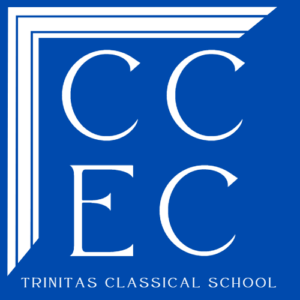 Welcome to our Classical Christian Education Corner! Watch for (short) pieces about classical Christian education, from the philosophical to the practical. We’ll include reflections on Scripture, poetry, philosophy, literature, summaries of relevant books, articles, podcasts, and “best practice” tips from fellow travelers on this journey toward “lives well-lived.” In these first weeks, we’ll draw on some lessons we’ve learned since founding Trinitas fourteen years ago.
Welcome to our Classical Christian Education Corner! Watch for (short) pieces about classical Christian education, from the philosophical to the practical. We’ll include reflections on Scripture, poetry, philosophy, literature, summaries of relevant books, articles, podcasts, and “best practice” tips from fellow travelers on this journey toward “lives well-lived.” In these first weeks, we’ll draw on some lessons we’ve learned since founding Trinitas fourteen years ago.
Trinitas’ tagline, “preparing students for lives well-lived,” is probably a good place to begin.
Let’s start by saying what this doesn’t mean. It doesn’t mean being successful primarily by worldly standards. It’s not about scoring well on standardized tests and college entrance exams, and participating in all the right extra-curriculars, and building an impressive transcript and application, and getting into the best schools and internships, and creating an outstanding resume, and getting a great job, and, and, and…
If that list stresses you out a little, it may be because these things should not be our focus in education.
Lesson 1. God does not call us to be successful; He calls us to be faithful: gaining perspective
We’re confident a lot of the things listed above will be a by-product of a classical Christian education. Let us repeat that: they will be a by-product. If they are the primary thing you are seeking for your child, or for yourself through your child, you are setting yourself up for anxiety, continual striving, and discontent. If some of this worldly success happens, that’s great—it is a blessing and a joy. But, if it does not, or if it does not look just like you hoped it would, that’s OK too because your heart, your identity is in Christ.
It was Mother Teresa who first said that “God has not called me to be successful; He has called me to be faithful.” Our goal then, for ourselves and for our children, in education (and in life), should be to hear the words: “Well done, good and faithful servant.” This first lesson should challenge you to stop and think seriously about what you are seeking in a classical Christian school. It is this counter-cultural perspective that frames all we try to do at Trinitas.
Watch for our next installment of CCE Corner where we’ll begin to look at some lessons that can help your student and you thrive in a classical Christian school.
